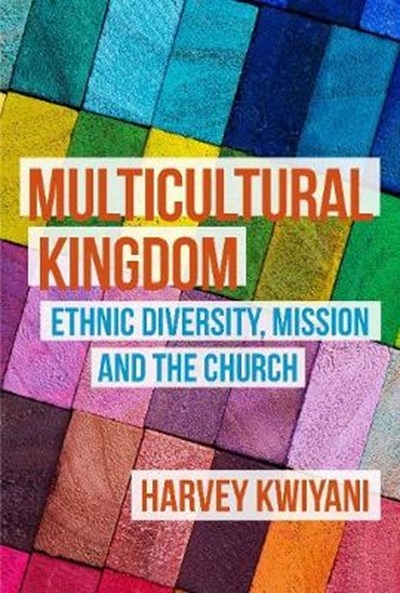Multicultural Kingdom by Harvey Kwiyani
Light-touch academic supported by story-telling, this is a balanced and readable exploration of the implications of ethnic diversity on the British Christian landscape
 Multicultural Kingdom - Ethnic Diversity, Mission and the Church
Multicultural Kingdom - Ethnic Diversity, Mission and the Church
By Harvey Kwiyani
SCM Press
ISBN: 9780334057529
Reviewed by Terry Young
Ethnicity is such a hot topic that I was nervous when I was invited to review Multicultural Kingdom: what lay in store for the tribe I was born into – working class white missionary?
As my adrenaline rush subsided, I encountered a balanced, thoughtful, study. In 11 short chapters, Harvey Kwiyani, lecturer in African Christianity and Theology at Liverpool Hope University, lays out the problem, explains how it arose and how it might be addressed. For a flavour, here are his chapter headings:
1. The Kingdom of God is Like a Mosaic
2. The Great New Fact of Our Era
3. Shaping the Kingdom
4. The Mission of the Kingdom
5. The Multicultural Kingdom is Here
6. Diversity is a Terrible Thing to Waste
7. The Multicultural Imperative
8. Multicultural Ecclesiology
9. One New Tribe
10. Making Multiculturalism Work
11. Monocultural Churches in a Multicultural World
His approach is light-touch academic supported by story-telling, which fills out the ideas and warms the page. Supported by plenty of references, Harvey has produced something readable and interesting, free of angst and animosity, that makes a challenging case.
The problem: Christianity was birthed in many cultures (Acts 2: 7-11) and the end game is clearly multicultural (Revelation 7:9), yet Sunday worship is sadly segregated. Harvey is even-handed, telling candid stories about African pastors in the UK, while pointing to the rejection Africans often feel in trying to join mainstream churches. He is critical of colonialism and Christian-on-Christian violence in Rwanda, for instance. Most of all, he is African with a passion.
I buy Harvey’s statement of the problem. I buy his belief that African Christianity could pour refreshment into western worship. I’m happy for Harvey to promote Arica as the Christian Continent of the Century (although I would look further east), and I grew up expecting that white would fade as the church expanded around the world – so I buy that, too.
I loved his analysis of the early church, with its movements of people (diasporas), such as the Jewish populations who prospered abroad after the exile and paved the path for the Apostle Paul and his peers. There is excellent analysis from 1 Corinthians and Ephesians, where cultural and racial divides are visible beneath the theological surface. He shows how the DNA of a faith birthed in waves of emigration and immigration is inherently multicultural.
Christianity came into a world divided by ethnicity, social status and gender; Harvey shows how Paul systematically demolishes those divisions. Personally, I found this a nice three-way framework and would like to see what Harvey might do with it some day.
As I read, I wondered how new our scene really is. The suddenness and scale of modern diasporas are certainly extreme, but people-tides were always with us. Also, places that were evangelistic beacons have become mission fields and vice versa. The beat may be faster, but surely the dance is an old one.
As I understand it, Harvey’s solution is additive – mix in more of other cultures. I haven’t visited the exemplar he holds up – Oasis International – but I can see how the idea works. And I’m open to that, too. I just suspect that fusion of cultures to create something new is more likely to work – especially for the next generation, which is already fusing futures in food, music, fashion and lifestyle. Why not in worship, too?
I circulated a first draft of this review to Christian friends, including a dozen who are part of modern diasporas. Their feedback endorses Harvey’s description of the problem. More than one told of being asked to move on at church. Nor is the solution easy: a British Asian pastor explained how he has tried for decades to broaden his cultural mix and met with limited success. Overall, the feedback was thoughtful and balanced, with a reflective range of ideas for going forward.
I know white churches that are dying while they rent their properties to non-white churches, oblivious to the obvious opportunity of blending something new.
Sometimes you glimpse a future unexpectedly. One morning at Communion, our youngest went to the front, where the British Nigerian deacon serving the elements handed him a piece of paper. I know some of the Nigerian mums ask about him regularly and pray for him – although he is 6’7” and in his mid-20s – so I thought maybe she had a verse for him. Turned out, she was telling him about a tub of Jollof Rice she had left him in the church fridge.
Harvey is right about the problem. Whatever the solution, I suspect it will cross the generations and involve eating together, symbolically with bread and wine, but elsewhere, too. How else will we be ready for that wedding feast when all the tribes finally worship together?
Very thought provoking. Thank you, Harvey!
Professor Terry Young is an author and member of a Baptist church. He set up Datchet Consulting which combines his experience in industry and academia
Baptist Times, 14/05/2021